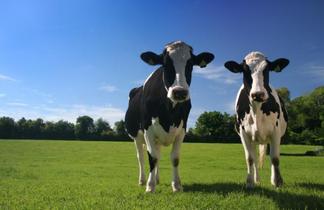The following simple facts may help to clarify Fish & Game’s position on this issue.
 Fish & Game's statutory roles are to manage, maintain and enhance sports fish and game.
Fish & Game's statutory roles are to manage, maintain and enhance sports fish and game.- Fish & Game is NOT anti-farming, we are pro-environmentally sustainable farming.
- Adverse environmental effects of agriculture are real and on-going.
- Agriculture is therefore affecting the raw material (the habitat) of Fish & Game’s core business.
- The Dairying and Clean Streams Accord is voluntary, has incomplete goals, and refers only to some of the aspects of dairy farming that degrade the environment.
- As the Accord is voluntary, there is no guarantee that the goals will be implemented.
Why is Fish & Game NZ in the 'dairying and the environment' debate?
- Habitat protection is critically important to the achievement of Fish & Game’s statutory duty. We realised long ago that if the habitat is looked after then the animals that rely on that habitat will largely look after themselves.
- Any activity that degrades the quality and/or extent of this habitat is therefore a threat to sports fish and game populations and Fish & Game is obliged to challenge its adverse environmental effects and those specific activities and agencies that cause it.
- Land and water, which comprises the fundamental natural elements of this habitat, is a finite natural resource. It is also the same natural resource that underpins primary industry. Every time land or water is allocated to an activity that diminishes its availability for sports fish or game bird habitat, or degrades (through pollution) that which remains, it reduces the sports fish & game resource that underpins Fish & Game’s reason-for-being.
It therefore ought to be no surprise why Fish & Game holds strong views about the adverse environmental effects of dairy farming.
What does the law say about environmental responsibility?
- Section 17 of the Resource Management Act 1991 states that: 'Every person has a duty to avoid, remedy or mitigate any adverse effect on the environment arising from an activity carried on by or on behalf of that person.’
- Section 15 of this Act states that: 'No person may discharge any Contaminant into water; or Contaminant onto or into land in circumstances which may result in that contaminant entering water.'
- The Act's definition of 'contaminant' includes farm fertilizer.
What are the scientific and official reports saying?
- There are now numerous reports over a long period of time by government agencies and regional statutory bodies that have identified the adverse environmental effects of agriculture, and especially intensive dairy farming.
- These reports all point to the fact that agriculture in general, and dairy farming in particular, has failed to meet the intent of Parliament as established by the requirements of ss.15 and 17 of the RMA.
- The issue has now progressed to the point where public opinion surveys have established that water quality is now perceived as New Zealand’s most significant environmental issue and that intensive agriculture is perceived to be the primary cause of the problem.
What is the relevance of all this to New Zealand?
- There is no question in the minds of the general public and industry alike that New Zealand’s unique point of difference, in terms of how it defines itself as a nation and differentiates its products in world markets, centres around its natural environment. New Zealand’s “clean and green/100% Pure” image is promoted extensively as a global brand.
- Without this brand New Zealand would have very little to command market status and an attractive international identity. And to endure it must have genuine and provable integrity. So where does New Zealand need to go?
- New Zealand agriculture has to make a traceable transition to environmental sustainability. There can be no secure, long-term, strategic future for New Zealand under a regime that supports and promotes environmentally unsustainable agriculture.
Who should be responsible for making this happen?
- Drawing from the relevant legislation, noted above, Fish & Game believes the primary duty lies with agriculture itself; and within agriculture it lies with the various agricultural sector leadership bodies.
- For the dairy industry this would be Dairy NZ and the Dairy Companies Association of NZ.
- A second order responsibility lies with central and regional government.
So what, specifically, is Fish & Game looking for?
- Dairy industry acknowledgement that there is a proven dairying and the environment problem to be solved.
- Dairy industry recognition that the primary responsibility for fixing this environmental problem lies with the industry itself, that the industry actually has a duty to do so.
- Dairy industry commitment to environmentally sustainable best on-farm practice becoming a mandatory requirement upon all suppliers, by a specified date with milestone dates to assess progress. This would include riparian buffer zone protection and independently audited whole-of-farm nutrient management plans.
- Dairy industry-lead consequences for suppliers who display persistent non-compliance with regional council resource consents.
- Dairy industry-lead consequences for suppliers who do not demonstrate performance in the transition to environmentally sustainable dairy farming.
- A central leadership role by the industry causing milk supplier contracts to include consistent environmental best practice conditions.
Download a copy of our position statement on Dairy Farming and the Environment.